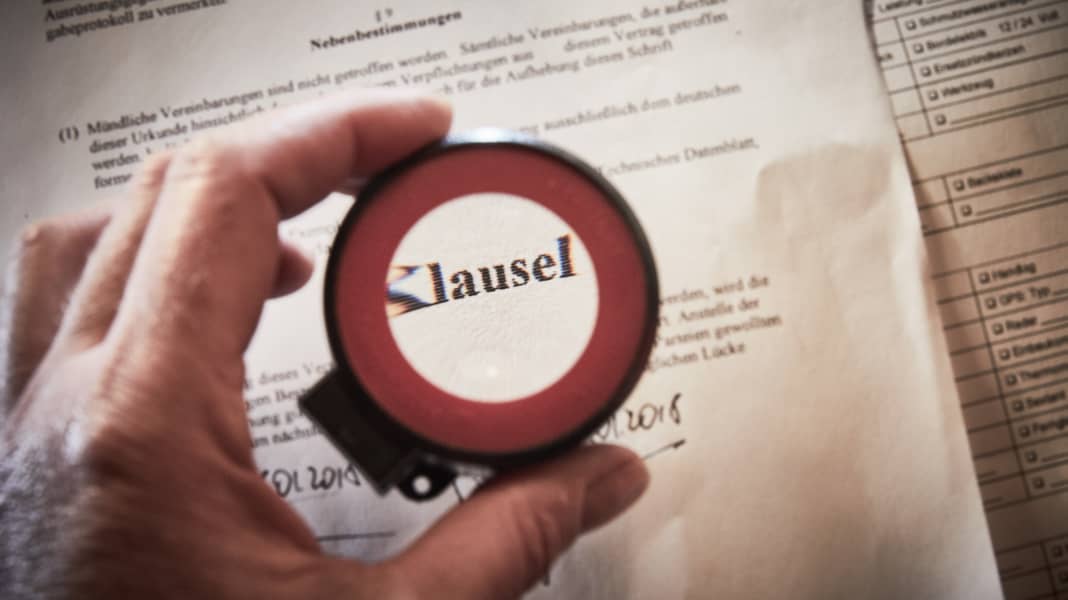
Check the person of the seller
Before purchasing, the buyer should make sure that the boat is actually owned by the seller. And whether he is who he claims to be. In concrete terms, this means asking the other party to show you their ID and checking that the name and address match the purchase contract.
Exclude community of owners
Before buying, it is important to check that the boat does not belong to the spouse, a community of owners or heirs, or even a bank or leasing company. In any case, the purchase contract must contain the assurance that the boat is free from third-party rights. You should also take a look at the seller's last purchase contract. If there is more than one signature, all owners must now agree to the sale. Ideally, a boat is registered in a German shipping register. This has the character of a land register; whoever is noted there as the owner is the owner. However, as cruising boats are not usually registered in this country, you have to make do with other documents as proof of ownership, such as the boat licence. They also provide clues, but are not legally binding.
Consider the person of the buyer
On the buyer's side, it is also important to ensure that all parties involved are included in the contract, for example in the case of a community of owners.
Determine transfer of ownership
The transfer of ownership is specifically regulated for movable property. "As a rule, ownership is transferred when the ship is handed over. Of course, other constellations can also be agreed in the contract, e.g. that ownership is not transferred until the last instalment of the purchase price has been paid. The fact that ownership is transferred can be problematic if damage occurs in connection with the boat to be sold, but the buyer does not yet have physical access to the boat. This is because damage to the yacht generally only falls within the buyer's area of risk from the time of transfer of ownership. It is therefore important to specify the time of transfer of ownership in a contract such as the Pantaenius model purchase agreement for boats in writing," says Gunnar Brock, in-house lawyer at Pantaenius Yachtversicherungen.

Warranty when purchasing from Retailer
Dealing with defects that the boat has when it is handed over is regulated by law and is called a warranty. In principle, it applies for two years from handover. However, a distinction must also be made as to whether the boat is sold by a dealer or privately.
In the event of defects, the buyer must assert his warranty claims against his contractual partner, i.e. the dealer. In contrast to new boats, the dealer can reduce the warranty period for a used boat to one year. However, a complete exclusion of warranty on the part of the dealer is not possible under any circumstances.
Time of the defect is important
If a warranty claim arises, the buyer must pay attention to when the defect became recognisable. Within the first twelve months of the two-year warranty period, the burden of proof lies with the dealer, as the law assumes that the defect was already present when the boat was handed over. After twelve months, however, the burden of proof is reversed: The buyer must then prove that the defect already existed at the time of handover. This burden of proof, and therefore the deadline, is therefore very important.
In the event of a warranty claim, the dealer is obliged to rectify the defect within a reasonable period of time. If this is not possible or the repair is unsuccessful, the buyer can reduce the price or cancel the purchase.
Even when buying a used boat from a dealer, the burden of proof turns after twelve months. However, the buyer cannot claim a warranty for all damage. A seven-year-old boat shows normal signs of use, which of course do not constitute a defect in terms of warranty law.
By the way: Since 01.01.2022, dealers have been obliged to provide further information on the condition of the boat. If, for example, a used boat is not in the same condition as comparable boats, the dealer must make specific reference to this. They must also offer updates for digital products such as navigation devices. However, this obligation can be contractually excluded.
In contrast to the warranty, the guarantee is a purely voluntary offer on the part of the manufacturer. It is limited to the repair of a defect and does not grant any rights to cancellation or reduction of the purchase price. Warranty claims must therefore be made against the manufacturer, i.e. the shipyard, and not against the dealer. How long a warranty is granted is set out in the warranty contract. There is no regulation regarding the burden of proof.
Warranty for the purchase of a Private individual
If you buy a used boat from a private individual, different warranty and guarantee rules apply. In contrast to a dealer, a private seller can completely exempt himself from warranty obligations. This is also common practice, but must be noted in writing in the purchase contract, otherwise the statutory warranty period of two years also applies to the private seller. As the warranty is usually excluded when buying from a private seller, it is all the more important to carefully inspect the boat in advance. It is advisable to take an expert with you or to commission them to carry out a full appraisal.
Private individuals also have the option of granting a guarantee, even if this only occurs in rare cases. A sensible guarantee would be, for example, for the seller to guarantee that the boat is damage-free in order to emphasise the integrity of the yacht.
Tip: Documentation by protocol
Once the purchase contract is finalised - regardless of whether it is a new or used boat - the handover should be documented very carefully in a protocol. This is usually based on an equipment list, which forms part of the purchase contract and is ticked off point by point. The handover of the ship's papers, VAT certificate, instructions for use and boat keys should also be recorded in the handover protocol, which must be signed by both parties.
This article is part of the Used boat purchase special. All contents:
- Buying a used boat: The key to success - How to do it right!
- The advantages and disadvantages of used boats
- How to find the right boat
- Typology - The most important types of motorboat
- Boat exchanges: Your guide through the online jungle
- You should look out for these weak points
- Checklists for the test drive and inspection
- How to avoid traps in the purchase agreement
- What new owners need to know
- You need these insurances for your boat

